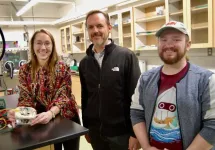(Press-News.org) Drugs known as GLP-1 analogues have become increasingly popular to treat diabetes and obesity, but there have been concerns that they might increase the risk of thyroid cancer. Now an extensive Scandinavian study led by researchers at Karolinska Institutet has found no evidence of such a link. The study is published in The BMJ.
GLP-1 receptor agonists, also known as GLP-1 analogues, reduce blood sugar levels and appetite. They are widely used in the treatment of type 2 diabetes and obesity, with their clinical use steadily increasing. Earlier studies and adverse event data have suggested that these drugs could be associated with an increased risk of thyroid tumours. However, due to limitations in data and methodology, clear conclusions could not be drawn, leading to uncertainty about this potential side effect.
“Many people take these medicines, so it is important to study potential risks associated with them,” says Björn Pasternak, principal researcher at the Department of Medicine, Solna, at Karolinska Institutet in Sweden. “Our study covers a broad group of patients and provides strong support that GLP-1 analogues are not associated with an increased risk of thyroid cancer.”
The researchers analysed national register data from Denmark, Norway, and Sweden of about 145,000 patients treated with GLP-1 analogues, mainly liraglutide or semaglutide, and 290,000 patients treated with another diabetes drug (DPP4 inhibitors). The risk of thyroid cancer was compared between the groups over an average follow-up period of just under four years.
GLP-1 treatment was not associated with an increased risk of thyroid cancer. The results were consistent also when compared to a third diabetes medication group (SGLT2 inhibitors).
“We cannot rule out that the risk of certain subtypes of thyroid cancer is increased in smaller patient groups that we could not study here, for example in people with a high congenital risk of medullary thyroid cancer who are advised against using these drugs,” says Peter Ueda, assistant professor at the Department of Medicine, Solna, at Karolinska Institutet.
The ongoing research program at Karolinska Institutet investigates the effects and potential side effects of newer diabetes medications such as GLP-1 analogues and SGLT2 inhibitors. These medications are now being used to treat broader patient groups, including those with obesity, heart failure, and kidney failure.
“We know from randomised clinical trials that they have positive effects, but clinical reality is different with patients varying in disease severity, comorbidities, and adherence to treatment recommendations,” says Björn Pasternak. “It’s therefore essential to investigate how these medicines perform in everyday clinical settings.”
The research was mainly financed by the Swedish Cancer Society, the Swedish Research Council and Karolinska Institutet. One of the co-authors is an employee of NordicRWE and another co-author reports fees for counselling and lectures from several pharmaceutical companies, see the scientific article for more information about potential conflicts of interest.
Publication: “Glucagon-like peptide 1 receptor agonist use and risk of thyroid cancer: Scandinavian cohort study”, Björn Pasternak, Viktor Wintzell, Anders Hviid, Björn Eliasson, Soffia Gudbjörnsdottir, Christian Jonasson, Kristian Hveem, Henrik Svanström, Mads Melbye, Peter Ueda, The BMJ, online 10 April 2024, doi: 10.1136/bmj-2023-078225.
END
Popular diabetes drugs do not increase thyroid cancer risk, study suggests
2024-04-10
ELSE PRESS RELEASES FROM THIS DATE:
Evidence for puberty blockers and hormone treatment for gender transition wholly inadequate
2024-04-10
The evidence on the use of puberty blockers and hormones for children and young people experiencing gender related distress is wholly inadequate, making it impossible to gauge their effectiveness or their impact on mental and physical health, find two systematic reviews of the available research, published in the Archives of Disease in Childhood.
Of the 50 studies included in the review looking at the effectiveness of puberty blockers for gender questioning teens, only one was of high quality, leading the authors to conclude that although most of the studies suggested that treatment might affect bone health and height: “No conclusions can be drawn about the impact ...
The genomic architecture of inherited DNA variants
2024-04-10
You have your mother’s eyes and your father’s smile, but genetics is much more than just what’s on the surface. In a study that spans more than a decade, researchers at Baylor College of Medicine have looked at generations of families in a specific population to reveal the role newly inherited DNA variants play on recessive disease traits, and in the process, they have created a population specific database revealing unique DNA information unseen in larger cohorts.
The findings, now published in Genetics in Medicine OPEN, revealed a correlation between occurrences of complex genetic ...
Baylor College of Medicine wins the 2024 STAT Madness science competition
2024-04-10
Baylor College of Medicine is the champion of the 2024 STAT Madness competition!
Similar to the March Madness bracket-style basketball competition, but focused on science, this national event pits research institutions against each other for the top innovation spot in science and medicine published in the previous year.
This year, 50 institutions across the U.S. sent their candidate studies to STAT Madness, which selected 64 for the competition. The winner is elected by popular vote. After five weeks of voting that gathered nearly 270,000 votes, the Baylor team outdid the Stanford University competitor with 64.8% of the vote ...
AACR: Trio of studies highlights promising early results with new cancer therapies and targets
2024-04-10
ABSTRACTS CT037, CT038, CT042
SAN DIEGO – Three early-phase clinical studies presented by researchers from The University of Texas MD Anderson Cancer Center at the American Association for Cancer Research (AACR) Annual Meeting 2024 show promising initial data for patients with lymphoma, gastric or gastroesophageal junction cancers, and specific molecularly selected tumors. The studies were featured in a clinical trials minisymposium highlighting novel agents and emerging therapeutic strategies. Information on all MD Anderson AACR Annual Meeting content can be found at MDAnderson.org/AACR.
Novel combination with evorpacept demonstrates promising results for ...
When should a surgeon plan for a career shift? New guidelines uphold lifelong competency of surgeons
2024-04-10
As millions of Americans approach age 66, they face the inevitable question, is it time to retire? The physician population is aging alongside the general population – more than 40% of physicians in the U.S. will be 65 years or older within the next decade. In the case of surgeons, there is little guidance on how to best ensure their competency throughout their career and at the same time maintain patient safety while preserving physician dignity.
In a current study published in the Journal of the American College of Surgeons, the American College of Surgeons (ACS) ...
Survival rates after hip or spine fracture worse than for many cancers
2024-04-09
A new article in JBMR Plus, published by Oxford University Press, indicates that patient survival rates after hip or other bone fractures can be very poor. While patients and their families may dismiss a fracture as a minor injury, survival rates can be lower than those for many types of cancer.
Scientists have gathered a body of evidence about mortality outcomes in patients over 50, but survival rates following bone fractures are not often included in the statistics available to patients or caregivers. The aim of this ...
Beating back bitter taste in medicine
2024-04-09
PHILADELPHIA (April 9, 2024) – The bitter taste of certain drugs is a barrier to taking some medications as prescribed, especially for people who are particularly sensitive to bitter taste. Published in Clinical Therapeutics, a team from the Monell Chemical Senses Center found that the diabetes drug rosiglitazone could partially block the bitter taste of some especially bad-tasting medications. Rosiglitazone could be added in small doses to other medicines, to make them less bitter and taste better.
This result provided new information. “To our knowledge, there are no previous reports on the bitter-blocking effect of this diabetes drug,” ...
Heart regeneration pioneer to join UW–Madison, Morgridge Institute
2024-04-09
04/09/2024
CONTACT: Deneen Wellik, wellik@wisc.edu
Heart regeneration pioneer to join UW–Madison, Morgridge Institute
MADISON — A biologist who explores the potential life-saving mechanisms of how organisms regenerate damaged heart and spinal cord tissue will join the University of Wisconsin–Madison and the Morgridge Institute for Research this fall.
Kenneth Poss, presently the James B. Duke Professor of Regenerative Biology at Duke University, explores a research area that has grown ...
Can the bias in algorithms help us see our own?
2024-04-09
Algorithms were supposed to make our lives easier and fairer: help us find the best job applicants, help judges impartially assess the risks of bail and bond decisions, and ensure that healthcare is delivered to the patients with the greatest need. By now, though, we know that algorithms can be just as biased as the human decision-makers they inform and replace.
What if that weren’t a bad thing?
New research by Carey Morewedge, a Boston University Questrom School of Business professor of marketing and Everett W. Lord Distinguished Faculty Scholar, found that people recognize more of their biases in algorithms’ decisions ...
This device gathers, stores electricity in remote settings
2024-04-09
Today wirelessly connected devices are performing an expanding array of applications, such as monitoring the condition of engines and machinery and remote sensing in agricultural settings. Systems known as the “Internet of Things” (IoT), hold much potential for improving the efficiency and safety of the equipment.
Yet stumbling blocks remain for IoT, thwarting many potential applications. How do you power these devices in situations where and when reliable electrical sources are not practically available?
Research from the University of Utah’s College of Engineering points to a possible solution in the form of a novel type of battery called ...




